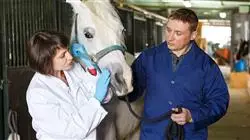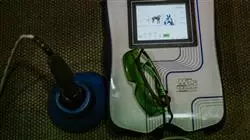University certificate
The world's largest faculty of veterinary medicine”
Introduction to the Program
Society demands veterinary professionals experienced in working with equines and with extensive knowledge of Electrophysical Agents of Rehabilitation in Horses. Don’t think twice and study with us”

Most of the electrophysical equipment discussed within this Postgraduate certificate represents a significant investment for veterinary physiotherapists, so it is necessary to understand its underlying scientific concepts and the therapeutic effects and applications, in order to choose the most appropriate therapies for the cases that often arise in clinical practice.
Thus, this program covers the different types of electrical currents used in physiotherapy and rehabilitation, which continue to be a basic tool in clinical practice, due to their versatility and ease of use: types of TENS, muscular electrostimulation, interferential and other electrical currents of interest. In addition, there will be a review of fundamental underlying concepts and scientific theory. Another important therapy for clinical practice is ultrasound, which has been used in human physiotherapy for many years, while in veterinary medicine it has been relegated by other therapies, but it has enjoyed renewed popularity thanks to new publications on its usefulness.
In the field of equine physiotherapy, shock waves have been used for more than 15 years, with numerous scientific articles supporting their clinical use, making related knowledge and skills for application essential. However, other innovative techniques such as percutaneous electrolysis offer promising results in the treatment of chronic tendinitis.
This Postgraduate certificate provides students with specialist tools and skills to enhance their professional practice, and key competencies such as knowledge of the day-to-day work of the veterinary professional, and responsibility in the monitoring and supervision of their work, as well as communication skills for effective teamwork.
Additionally, as it is a 100% online program, the student is not constrained by fixed timetables or the need to move to another physical location, but can access the contents at any time of the day, balancing their professional or personal life with their academic life.
Do not miss the opportunity to take this Postgraduate certificate in Electrophysical Agents of Rehabilitation in Horses. It's the perfect opportunity to advance your career"
This Postgraduate certificate in Electrophysical Agents of Rehabilitation in Horses contains the most complete and up-to-date scientific program on the market. The most important features include:
- The examination of practical cases presented by experts in equine physiotherapy and rehabilitation
- Graphic, schematic, and practical contents with which provide scientific and practical information on the disciplines that are essential for professional practice
- Practical exercises where the self-assessment process can be carried out to improve learning
- A special emphasis on innovative methodologies for Electrophysical Therapies for Equine Rehabilitation
- Theoretical lessons, questions to the expert, debate forums on controversial topics, and individual reflection assignments
- Content that is accessible from any fixed or portable device with an Internet connection
This Postgraduate certificate is the best investment you can make in selecting a refresher program to update your knowledge in Electrophysical Agents of Rehabilitation in Horses”
The teaching staff includes veterinary professionals, who bring their professional experience to this program, as well as recognised specialists from leading societies and prestigious universities.
Its multimedia content, developed with the latest educational technology, will provide the professional with situated and contextual learning, i.e., a simulated environment that will provide an immersive education programmed to learn in real situations.
This program is designed around Problem-Based Learning, whereby the professional must try to solve the different professional practice situations that arise throughout the program. For this purpose, the professional will be assisted by an innovative interactive video system developed by renowned and experienced experts in Electrophysical Agents of Rehabilitation in Horses.
This specialisation comes with the best didactic material, providing you with a contextual approach that will facilitate your learning"

This 100% online Postgraduate certificate will allow you to balance your studies with your professional work while increasing your knowledge in this field"
Why study at TECH?
TECH is the world’s largest online university. With an impressive catalog of more than 14,000 university programs available in 11 languages, it is positioned as a leader in employability, with a 99% job placement rate. In addition, it relies on an enormous faculty of more than 6,000 professors of the highest international renown.

Study at the world's largest online university and guarantee your professional success. The future starts at TECH”
The world’s best online university according to FORBES
The prestigious Forbes magazine, specialized in business and finance, has highlighted TECH as “the world's best online university” This is what they have recently stated in an article in their digital edition in which they echo the success story of this institution, “thanks to the academic offer it provides, the selection of its teaching staff, and an innovative learning method aimed at educating the professionals of the future”
A revolutionary study method, a cutting-edge faculty and a practical focus: the key to TECH's success.
The most complete study plans on the university scene
TECH offers the most complete study plans on the university scene, with syllabuses that cover fundamental concepts and, at the same time, the main scientific advances in their specific scientific areas. In addition, these programs are continuously being updated to guarantee students the academic vanguard and the most in-demand professional skills. In this way, the university's qualifications provide its graduates with a significant advantage to propel their careers to success.
TECH offers the most comprehensive and intensive study plans on the current university scene.
A world-class teaching staff
TECH's teaching staff is made up of more than 6,000 professors with the highest international recognition. Professors, researchers and top executives of multinational companies, including Isaiah Covington, performance coach of the Boston Celtics; Magda Romanska, principal investigator at Harvard MetaLAB; Ignacio Wistumba, chairman of the department of translational molecular pathology at MD Anderson Cancer Center; and D.W. Pine, creative director of TIME magazine, among others.
Internationally renowned experts, specialized in different branches of Health, Technology, Communication and Business, form part of the TECH faculty.
A unique learning method
TECH is the first university to use Relearning in all its programs. It is the best online learning methodology, accredited with international teaching quality certifications, provided by prestigious educational agencies. In addition, this disruptive educational model is complemented with the “Case Method”, thereby setting up a unique online teaching strategy. Innovative teaching resources are also implemented, including detailed videos, infographics and interactive summaries.
TECH combines Relearning and the Case Method in all its university programs to guarantee excellent theoretical and practical learning, studying whenever and wherever you want.
The world's largest online university
TECH is the world’s largest online university. We are the largest educational institution, with the best and widest online educational catalog, one hundred percent online and covering the vast majority of areas of knowledge. We offer a large selection of our own degrees and accredited online undergraduate and postgraduate degrees. In total, more than 14,000 university degrees, in eleven different languages, make us the largest educational largest in the world.
TECH has the world's most extensive catalog of academic and official programs, available in more than 11 languages.
Google Premier Partner
The American technology giant has awarded TECH the Google Google Premier Partner badge. This award, which is only available to 3% of the world's companies, highlights the efficient, flexible and tailored experience that this university provides to students. The recognition as a Google Premier Partner not only accredits the maximum rigor, performance and investment in TECH's digital infrastructures, but also places this university as one of the world's leading technology companies.
Google has positioned TECH in the top 3% of the world's most important technology companies by awarding it its Google Premier Partner badge.
The official online university of the NBA
TECH is the official online university of the NBA. Thanks to our agreement with the biggest league in basketball, we offer our students exclusive university programs, as well as a wide variety of educational resources focused on the business of the league and other areas of the sports industry. Each program is made up of a uniquely designed syllabus and features exceptional guest hosts: professionals with a distinguished sports background who will offer their expertise on the most relevant topics.
TECH has been selected by the NBA, the world's top basketball league, as its official online university.
The top-rated university by its students
Students have positioned TECH as the world's top-rated university on the main review websites, with a highest rating of 4.9 out of 5, obtained from more than 1,000 reviews. These results consolidate TECH as the benchmark university institution at an international level, reflecting the excellence and positive impact of its educational model.” reflecting the excellence and positive impact of its educational model.”
TECH is the world’s top-rated university by its students.
Leaders in employability
TECH has managed to become the leading university in employability. 99% of its students obtain jobs in the academic field they have studied, within one year of completing any of the university's programs. A similar number achieve immediate career enhancement. All this thanks to a study methodology that bases its effectiveness on the acquisition of practical skills, which are absolutely necessary for professional development.
99% of TECH graduates find a job within a year of completing their studies.
Postgraduate Certificate in Electrophysical Rehabilitation Agents in Horses
.
Electrophysical rehabilitation agents in horses are an effective tool used in the physical therapy of horses to help them recover from injuries, improve their physical condition and maintain optimal performance in training and competition. Agents such as electrotherapy, magnetic therapy and ultrasound therapy, apply electric currents, magnetic fields and ultrasound waves respectively, to relieve pain, reduce inflammation, promote tissue healing and improve muscle function in horses. Do you want to specialize in the use of these non-invasive and safe methods? At TECH Global University you can find the Postgraduate Certificate in Electrophysical Rehabilitation Agents in Horses, which will help you to achieve this goal. The program is 100% online and is composed of innovative teaching resources that will give a boost to your learning experience. The program will allow you to explore aspects such as equine anatomo-physiology, the evaluation and diagnosis of injuries in horses and the planning of rehabilitation programs.
Learn about electrophysical rehabilitation agents in horses
.
At TECH Global University we bring you innovative teaching programs that transform the traditional models of teaching. In addition, we offer state-of-the-art academic resources that include theoretical and practical lessons, continuous support from experts and study material taught in multimedia format. Through the syllabus, you will learn the functions, indications and contraindications of electrotherapy, magnetic therapy, ultrasound therapy, laser therapy and hydrotherapy. In this way, you will know how to integrate electrophysical agents in an equine rehabilitation plan, adapting them to the specific needs of each horse and to the different stages of recovery, contributing to the improvement of their general health and performance. If you want to learn more, don't delay and enroll now, with TECH Global University you are one step closer to professional success, without having to leave your home.







